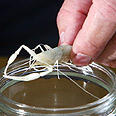
Underground world found at quarry
Previously unknown species discovered at cave located within premise of cement factory in southern city of Ramle
“It is a unique site on an international scale,” Prof. Amos Frumkin of the Hebrew University's Geography Department said during a press conference held Wednesday morning. “So far we have identified eight species of invertebrates, most of which were not known before.”

New crab species (Photo: Sasson Tiram)
The cave, which spans across 2.5 kilometers (roughly 1.5 miles) and is 100-meter (roughly 30 feet) deep, is the second largest lime cave in Israel. In order to explore the cave researchers are required to climb ropes and crawl through most of it. Due to its scientific significance and the fact it is located inside an active quarry, the cave is currently closed to visitors.
Species millions of years old
Four species of invertebrates were found in the lake inside the cave; the other four species inhabit the cave’s terrain. The lake is a habitat for bacteria that synthesize the sulfur in the water as a source for energy, thus creating the nutritional infrastructure for the cave’s aquatic and terrestrial ecosystems.
The cave’s uniqueness is due mainly to its isolation from the outside world, since the cave’s surface is situated under a layer of chalk that is impenetrable to water. The underground cave includes an underground lake, in which the crustaceans were found.
The lake is part of the Yarkon-Taninim aquifer, one of Israel’s two aquifers, yet is different in temperature and chemical composition from the main waters of the aquifer. The lake’s temperature and salinity indicate that its source is deep underground.
The species have been sent to biological experts in both Israel and abroad for further analysis and dating. It is estimated that these species are millions of years old.
Yoel Feldschue, director-general of Nesher Industries, said today that Nesher will preserve the ecosystem which has been revealed in the center of its quarry in order to avoid any damage to the important findings there. He added that he is hopeful that the planning authorities will enable the company to operate in alternative areas in order to help preserve the site.










